Good News in History, August 21
85 years ago today, civil rights protestors quietly entered the library in Alexandria, VA to stage a sit-in. One young black man, well-dressed and polite, entered and requested a library card. When he was declined, he picked up a book, sat down, and began to read just 2 minutes before another young African American repeated the same act. This continued until five young men were silently reading at tables, and the flustered library staff called the police. READ all the other details of this lesser-known moment in the Civil Rights Movement… (1939)
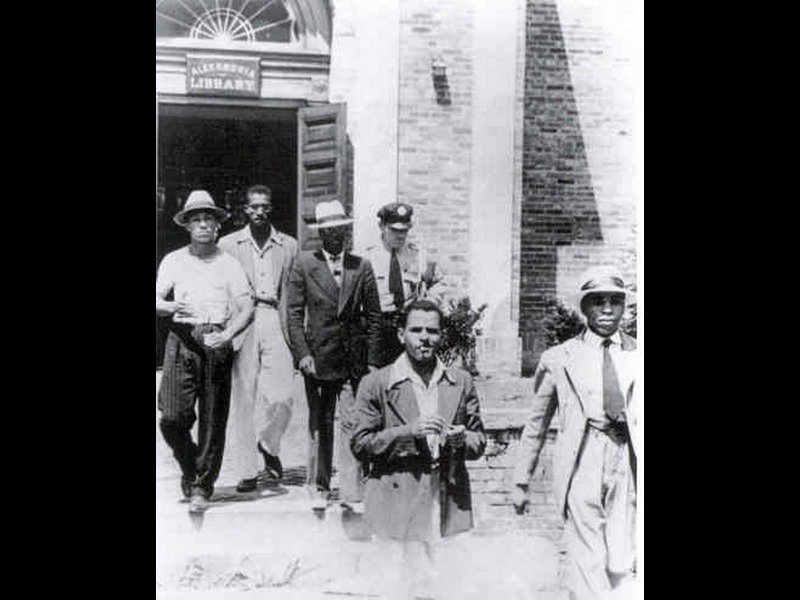
It was organized by Samuel Wilbert Tucker, a Bar-certified Virginia attorney. He tried for several years to establish equal access to community resources, but the white community, including the Alexandria Library Board, remained unswayed.
It was his plan to stage the sit-in, and his brother William was one of the sit-in protestors who sat reading while one of their party ran to Tucker’s law office to alert him that the police had been called.
Officers arrived and escorted the protestors from the library, arresting them for “disorderly conduct.” Samuel Tucker had called a photographer, who took a photo, and then quickly arranged for their release. He planned to challenge the city in court on the grounds that all citizens were entitled to equal access to public services. But the city, in an effort to resist integration, stalled the process with intense negotiations.
In 1940, community leaders proceeded without the young attorney’s involvement and accepted the promise of a “separate but equal” library. Tucker was infuriated. The Alexandria Library Board quickly approved the construction of the Robert H. Robinson Library, appropriated funding for books, and hired an African American librarian.
On February 13th, 1940, Samuel Tucker replied to a letter from Librarian Katharine A. Scoggin inviting him to apply for a library card at Robinson Library, writing: “I refuse and will always refuse to accept a card to be used at a library to be constructed on Alfred and Wythe Street in lieu of a card to be used at the library already existing on Queen Street to which I have made application. Continued delay – beyond the closing of this month – in issuing to me a card to be used at the library on Queen Street will be taken as a refusal to do so, whereupon I will feel justified in seeking the aid of the court to enforce my right.”
MORE Good News on this Day:
- Vienna’s Stadtpark opened its gates as the first public park in Vienna (1862)
- Count Basie, the American pianist, composer, and bandleader, was born (1904)
- Walt Disney released its beloved animated movie Bambi (1942)
- Hawaii’s vote for statehood was signed by the US President into law making it the 50th state (1959)
- Motown released what would be its first #1 hit, “Please Mr. Postman” by The Marvelettes (1961)
- Latvia declared its full independence from the Soviet Union (1991)
- NATO decided to send a peace-keeping force to the former Yugoslav Republic of Macedonia (2001)
Happy 36th birthday to Robert Lewandowski, the greatest Pole to ever kick a soccer ball. He is part of a small group of elite European footballers who have scored over 600 goals in their professional careers. Yet further, he has the honor of being the only other player alongside the legend Johan Cruyff, to achieve the European treble while being the highest goalscorer in all three competitions. In the German Bundesliga, he won the league title in 10 of the 12 seasons in which he competed, 2 for Borussia Dortmund, and 8 for Bayern Munich.

Born in Warsaw, Lewandowski’s early stints at Pruszkow and Poznan sent up warning flares to clubs in Europe’s top divisions. Two early attempts by bigger clubs to sign him fell through, the first by Blackburn in England, the second in Italy’s Genoa. He ended up signing for Borussia Dortmund in 2010 to lead the attack of new young German manager Jurgen Klopp. In the 2011-2012 season, he was electric, scoring 30 goals in all competitions, including a hat-trick in a 5-2 win against Bayern Munich in the DFB-Pokal Final to earn the club its first domestic double.
In 2014-15 he signed for rivals Bayern Munich, where he went on to win 8 consecutive Bundesliga titles, with a goals-per-game ratio over those 8 years of nearly 1 in 1 (238 in 253 games) a truly astonishing return. During that time he also helped the club win its 5th UEFA Champions League in 2019-2020.
For his country, his 79 international goals place Lewandowski as the all-time top scorer for Poland and the third overall men’s international goalscorer in Europe, only behind Ferenc Puskás (84) and Cristiano Ronaldo (123).
Today, he is seeing out the final years of his career at FC Barcelona. (1988)
63 years ago today, Patsy Cline recorded the classic song, Crazy.
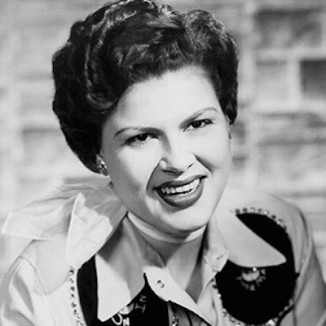
Although still on crutches after a head-on collision two months earlier and having difficulty reaching the high notes at first due to her broken ribs, Crazy became her signature tune, and it spent 21 weeks on the chart.

Written by Willie Nelson, the song’s success and complex melody helped launch him as a performer as well as a songwriter. Cline’s version is ranked No. 85 on Rolling Stone magazine‘s list of The 500 Greatest Songs of All Time. Tragically, Cline died 19 months later, at age 30 in a plane crash. WATCH her perform it… (1961)
And, on this day 86 years ago, singer-songwriter, actor, and entrepreneur Kenny Rogers was born.
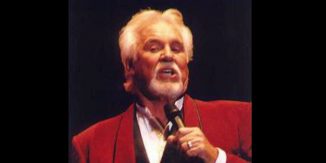
In a career spanning six decades, Rogers has scored more than 120 hit singles, like The Gambler (a Don Schlitz song), and Islands in the Stream (with Dolly Parton), in both the country and pop genres, with sales of over 100 million records worldwide, making him one of the best-selling music artists of all time. He has retired from touring but says he may record one more album. In the last decade, the Houston, Texas native, who also co-founded the restaurant chain Kenny Rogers Roasters, released a memoir, Luck or Something Like it, and has co-written a novel, What Are the Chances. FUN FACT: Do you know who wrote the famous duet, Islands in the Stream? Surprise. It was The Bee Gees. (1938-2020)
And, on this day in 1944, in the wake of World War II, leaders from Russia, the UK, and US gathered at the Dumbarton Oaks mansion in Washington DC, for deliberations known as the Washington Conversations on International Peace and Security. With a delegation from China arriving soon after, the resulting charter of principles became the founding document of the United Nations, and shaped the future workings of the UN.

The Dumbarton Oaks estate, with its 16 acres of gardens in the neighborhood of Georgetown, is now a public garden and museum, and has continued since 1933 to be a research library dedicated to the fields of Byzantine and Pre-Columbian studies, garden design, and landscape architecture, thanks to its founding couple, the diplomat Robert Woods Bliss and his wife Mildred.
And, Happy 38th birthday to the world’s fastest man, Usain Bolt. The Jamaican superstar sprinter who retired in 2017 is a world record holder in the 100-meters, 200m and 4 × 100m relay.
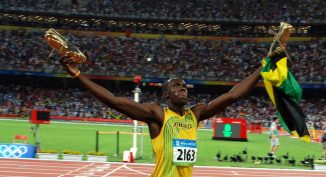
When he won his ninth Olympic gold medal in Rio, pulling away from the pack in the men’s 4x100m relay, he secured his historic ‘triple triple’ victory winning the 100m, 200m, and men’s relay in three straight Olympics (2008, 2012 and 2016)—the only track star ever to do it.
He gained worldwide fame for his double sprint victory in world record times at the 2008 Beijing Olympics, which made him the first person to hold both records since fully automatic time became mandatory. RE-LIVE Bolt’s career below… (1986)
On this day 270 years ago, William Murdoch the Scottish inventor who invented gas lighting and the steam-powered locomotive, was born in Ayrshire. For most of his professional life, Murdoch was the diligent set of cerebrals behind the success of the engineering firm Boulton and Watt, under which his name and credit were largely buried. Now though he is recognized among the pantheon of the great Scottish inventors.
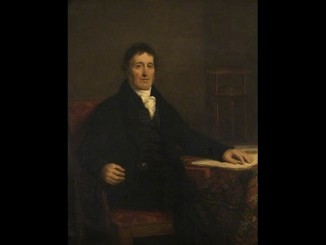
Early on in Murdoch’s career at Boulton and Watt, he was sent to erect and maintain steam engines for the purpose of pumping water out of Cornish tin mines, which he did with such diligence and savvy that Mr. Boulton wrote “We want more Murdocks, for of all others he is the most active man and best engine erector I ever saw…When I look at the work done it astonishes me & is entirely owing to the spirit and activity of Murdoch who hath not gone to bed 3 of the nights.”
Substantial evidence exists that, despite the patent being filed by his boss Watt, Murdoch invented the Sun and Planet gear for the steam engine, whereby a small gear at the end of a vertical arm rotates around a large gear owing to the up and down motion of the arm, to the end of turning a large wheel such as a mill or the wheels of a train—on which this design is still used today.
This wasn’t the last innovation in steam power that Murdoch dreamed up—he nearly patented a three-wheeled steam locomotive—the first in the world, but was dissuaded by his employers.
“It is no less than drawing carriages upon the road with steam engines…he says that what he proposes, is different from anything you ever thought of, and that he is positively certain of its answering and that there is a great deal of money to be made by it,” a colleague of Murdoch wrote to Mr. Watt.
The man who eventually did patent the first steam locomotive, A. Trevithick, lived next to Murdoch for some years, and would have certainly seen his work. Murdoch’s son wrote in a letter that his father had made a demonstration of it to the town.
However, Murdoch’s most substantial invention was that of gas lighting, developed between 1792 and 1794. The first industrial factory to be illuminated by gas was the Philips and Lee cotton mill in Manchester which was fully lit by Murdoch in 1805. Initially, this mill contained 50 gas lights, although this soon grew to 904. The length of time taken to complete this project was partly due to experimentations and improvements in the process developed by Murdoch to make the lighting of a large factory by gas practicable and cost-effective – such as purifying the gas with lime.
Once again he was undone by his employers. Mr. Watt’s son dissuaded Murdoch from seeking a patent based on his own failures in area. This loss of time allowed other commercial interests to develop forms of gas lighting and apply for patents. Even still, by May of 1809 Boulton and Watt faced little competition in any gas market due to their success in lobbying Parliament to block the granting of a charter for the National Heat and Light Company, their only real competitor in this field. However, despite blocking the charter until 1812 this advantage was squandered as Boulton and Watt did not develop the gas market, or technology, and in 1814 abandoned the gas business altogether. A few decades later most towns in Britain were lit by gas and most had their own gasworks.
Murdoch’s is a fascinating story of entrepreneurialism’s dos and don’ts, but it’s safe to say that his mind was one of the sharpest in all of Scotland at that time, and he probably deserved a better set of bosses. (1754)
SHARE The Milestones, Memories, and Music…
>read more at © GoodNews
Views: 3